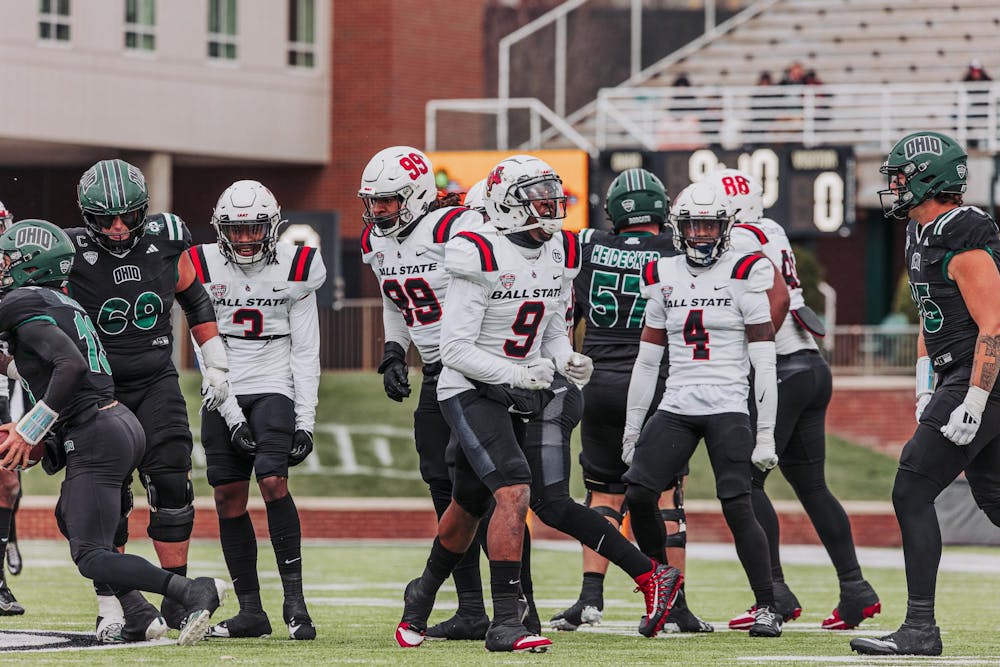Ball State wraps up its 2024 season with a 42-21 loss to Ohio on Black Friday.
The Cardinals close out their season with a 3-9 record and 2-6 in the Mid-American Conference (MAC). The Bobcats solidified their trip to Detroit for the MAC Championship with the win.
The 3-9 record is the worst season since 2017. The loss also continues a losing streak to Ohio that goes back to 2012.
Here are three takeaways from the loss.
Eight plays, 14 points.
The Bobcats only needed eight plays in their first two drives to score 14 points.
Ohio’s first drive went 78 yards on just five plays and was capped off with a 50-yard dime from graduate student quarterback Parker Navarro to graduate student wide receiver Owen Coleman.
The 50-yard touchdown was wide open with Coleman creating at least five yards of separation on redshirt junior defensive back Thailand Baldwin.
After Ball State pooch punted it away, the Bobcats went back to work. Navarro hit Owen again, this time for a 41-yard touchdown pass.
The Cardinals immediately put themselves in a bad situation. It only took Ohio 4:06 to score both of their opening touchdowns, and they went up 14-0 almost instantly.
To make matters worse, the Cardinals did not score in the first quarter and two out of their three drives were three-and-outs. The defensive mistakes in the first quarter started Ball State down a path to a loss and ended up hurting their chances of winning.
Offensive first-half flounder.
As already stated, Ball State went three-and-out on their second and third drives and failed to score until the 8:18 mark in the second quarter.
The third drive started with Baldwin bringing in an interception but Ball State failed to convert on the turnover and squandered an opportunity to strike back.
The Cardinals' only score in the first half came from redshirt freshman quarterback Kadin Seomza finding redshirt sophomore wide receiver Dahya Patel for a 33-yard touchdown. It was also Patel’s first touchdown of his collegiate career, making it 21-7.
Ball State immediately recovered an onside kick after scoring, making it the first time since 2019 that the Cardinals recovered an onside kick. An offensive pass interference took the Cardinals out of striking range, but a few plays later a defensive pass interference set Ball State up with only 30 yards to go.
The Cardinals inched down to the 21-yard line, but the fourth and one run was stopped, forcing a turnover on downs.
The Ball State offense, combined with the rough start, failed to make any real gain on the Bobcats before closing the half.
Rushing game: A lot to a little.
The Bobcats outrushed the Cardinals 270-42. That is a 228-yard differential on the ground.
The Cardinals, who were down for the entirety of the game, looked to the air to make up the scoring gap. But looking to the air also closed off the rushing attack, making the Ball State offense one-dimensional.
Semonza tallied the most passing attempts of the season with 47 and was 29-47 on those passes.
Abandoning the rushing attack has often hurt Ball State by taking away half of its offensive power, and it showed its ugly head again today.
Contact Elijah Poe via email at elijah.poe@bsu.edu or on X @ElijahPoe4.
3 takeaways from the Ball State football 42-21 loss to Ohio

Senior linebacker Keionte Newson celebrates after a play against Ohio. Ball State Athletics, photo provided




